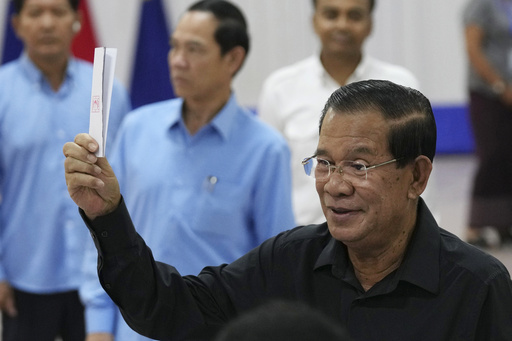
Cambodian former Prime Minister Hun Sen, foreground, of ruling Cambodian People’s Party, shows off a ballot paper before voting for senate election at Takhmau polling station in Kandal province, southeast of Phnom Penh, Cambodia, Sunday, Feb. 25, 2024. The National Election Committee on Monday, Feb. 26, began releasing results by constituency, after earlier announcing that according to a provisional overall count, the Cambodian People’s Party won 55 of the 58 seats that were contested on Sunday. AP FILE PHOTO
PHNOM PENH, Cambodia — The long-ruling Cambodian People’s Party has won an expected landslide victory in the election for the country’s Senate, the National Election Committee has confirmed.
The committee on Monday began releasing results by constituency, after earlier announcing that a provisional count showed the Cambodian People’s Party won 55 of the 58 seats that were contested on Sunday. The chamber has 62 members, with two senators appointed by King Norodom Sihamoni and two others by the National Assembly, which is the lower house of Parliament.
The vote paves the way for Hun Sen, who is the ruling party president, to become Senate President, allowing him to hold an official position in government after stepping down last year after serving for 38 years as prime minister. He was succeeded as prime minister by his son, Hun Manet.
READ: Cambodia ex-PM Hun Sen returns to frontline politics for senate seat
The Senate’s duties are largely ceremonial, focusing on ratifying measures passed by the National Assembly. But the Senate President serves as active head of state when the king is absent from the country.
The lopsided election outcome was never in doubt. The vote for the Senate is carried out the 125 members of the National Assembly and the 11,622 local commune councilors. The Cambodian People’s Party strongly dominates both institutions.
It has 120 seats in the National Assembly, while the royalist FUNCINPEC party holds the other five. In the last two general elections, controversial court rulings kept the most popular opposition parties off the ballot.
The provisional figures for the Senate show three seats going to a coalition of opposition parties calling itself the Khmer Will Party.
Cambodian People’s Party spokesperson Sok Eysan said the Senate election results were better than his party initially expected and that Hun Sen is likely to be elected the new Senate President in April after the National Election Committee issues the official final results.
READ: Cambodia’s new PM gets OK for younger brother to be his deputy
Hun Sen, 71, was Asia’s longest-serving leader when he stepped down as prime minister in favor of his eldest son, 46-year-old Hun Manet, who had been serving as army commander. Hun Sen has repeatedly said he would continue to play a leading role in guiding Cambodia’s politics.
Last week, Hun Sen’s youngest son, 41-year-old Hun Many, who is the civil service minister, won approval by lawmakers to serve as the deputy prime minister in his older brother’s government.
Sam Rainsy, the popular but long-exiled former opposition leader, declared Sunday on his Facebook page that even the minor gains of the opposition forces in the Senate election were encouraging signs for democracy. He declared that pro-democracy forces could declare that gaining three seats was a victory in the face of great difficulties they faced including fear, alleged threats and vote-buying.